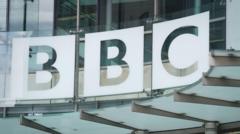The BBC has responded to criticism from the White House regarding its coverage of the ongoing Gaza conflict, specifically addressing claims made by press secretary Karoline Leavitt. At a press briefing, Leavitt accused the BBC of taking "the word of Hamas" about casualty figures and incorrectly asserted that the news organization retracted a story.
In a statement, the BBC clarified, "The claim the BBC took down a story after reviewing footage is completely wrong. We did not remove any story and we stand by our journalism." The broadcaster explained that updates to casualty figures throughout the day are standard procedure for fast-developing news situations. The reporting cited varying numbers attributed clearly to sources like medics and health officials as combatants within the region have different accounts of events.
Controversial incidents at an aid distribution point in Rafah have sparked conflicting narratives. Witnesses and NGOs reported civilian shootings, while the Israeli military contested these claims. The challenges of obtaining accurate information are compounded by Israel's restrictions on international journalists entering Gaza.
On the same day, local reports indicated Israeli forces shot at civilians collecting aid, resulting in numerous fatalities. However, the Israeli Defense Forces (IDF) alleged that their actions were in response to perceived threats from individuals deviating from designated routes.
Additionally, Leavitt remarked that the BBC had removed a story due to a lack of evidence regarding a viral video. The BBC clarified that while it examined the video, it was not used in its reporting and stressed the importance of truthful narratives in a complex environment where journalists face significant barriers in accessing information.
As the humanitarian crisis continues to escalate, the BBC reiterated its call for journalists to be granted access to Gaza, emphasizing the need for accurate reporting on the situation, alongside figures indicating an alarming death toll since the onset of hostilities.
In a statement, the BBC clarified, "The claim the BBC took down a story after reviewing footage is completely wrong. We did not remove any story and we stand by our journalism." The broadcaster explained that updates to casualty figures throughout the day are standard procedure for fast-developing news situations. The reporting cited varying numbers attributed clearly to sources like medics and health officials as combatants within the region have different accounts of events.
Controversial incidents at an aid distribution point in Rafah have sparked conflicting narratives. Witnesses and NGOs reported civilian shootings, while the Israeli military contested these claims. The challenges of obtaining accurate information are compounded by Israel's restrictions on international journalists entering Gaza.
On the same day, local reports indicated Israeli forces shot at civilians collecting aid, resulting in numerous fatalities. However, the Israeli Defense Forces (IDF) alleged that their actions were in response to perceived threats from individuals deviating from designated routes.
Additionally, Leavitt remarked that the BBC had removed a story due to a lack of evidence regarding a viral video. The BBC clarified that while it examined the video, it was not used in its reporting and stressed the importance of truthful narratives in a complex environment where journalists face significant barriers in accessing information.
As the humanitarian crisis continues to escalate, the BBC reiterated its call for journalists to be granted access to Gaza, emphasizing the need for accurate reporting on the situation, alongside figures indicating an alarming death toll since the onset of hostilities.


















